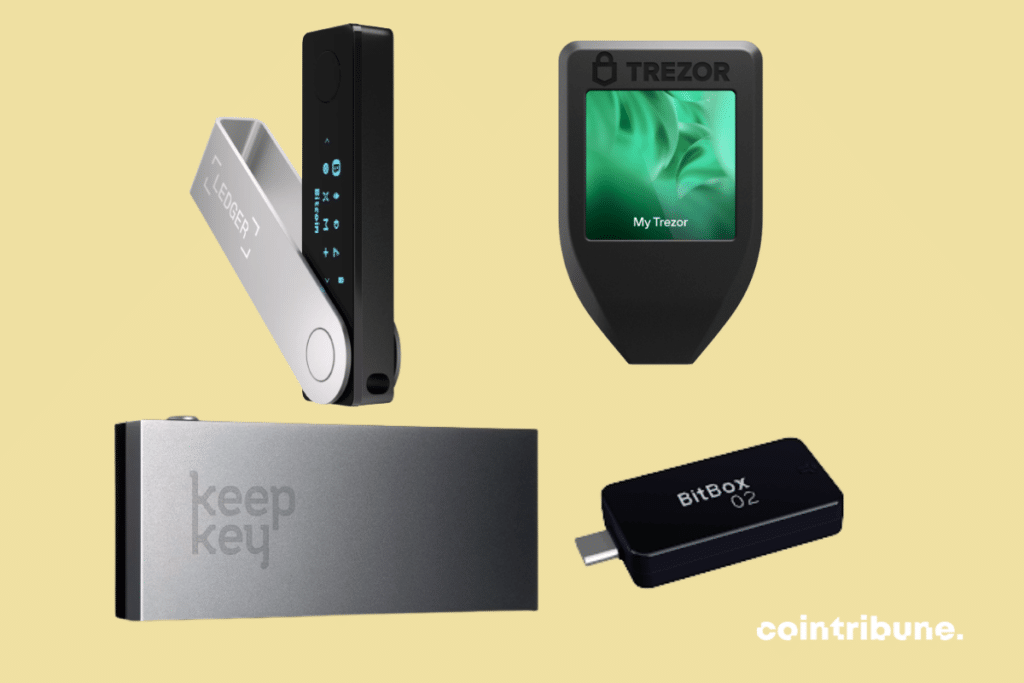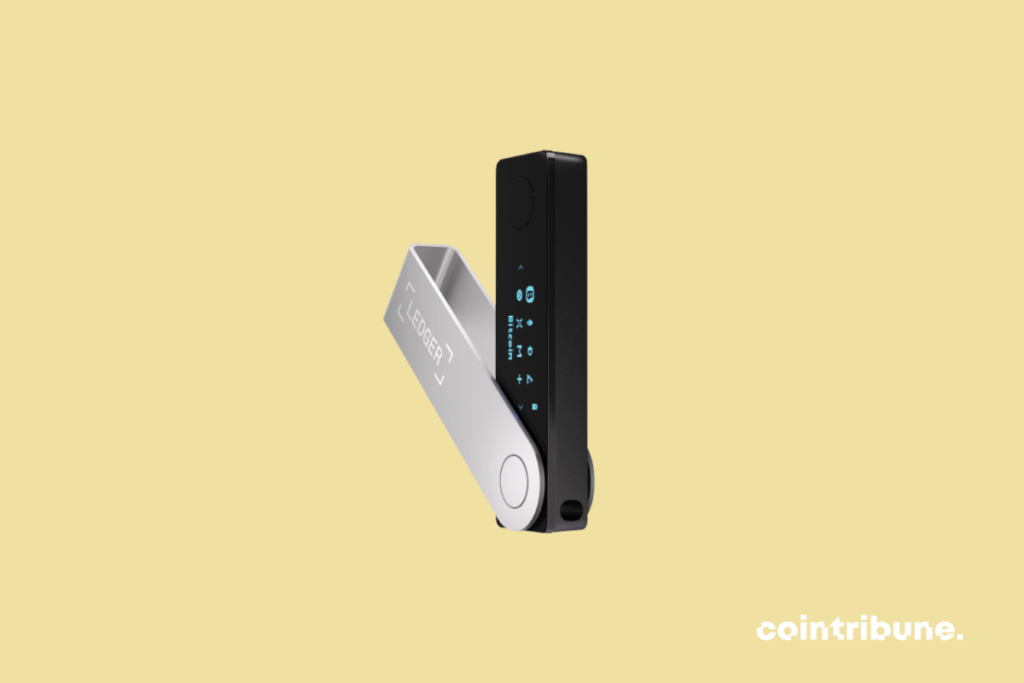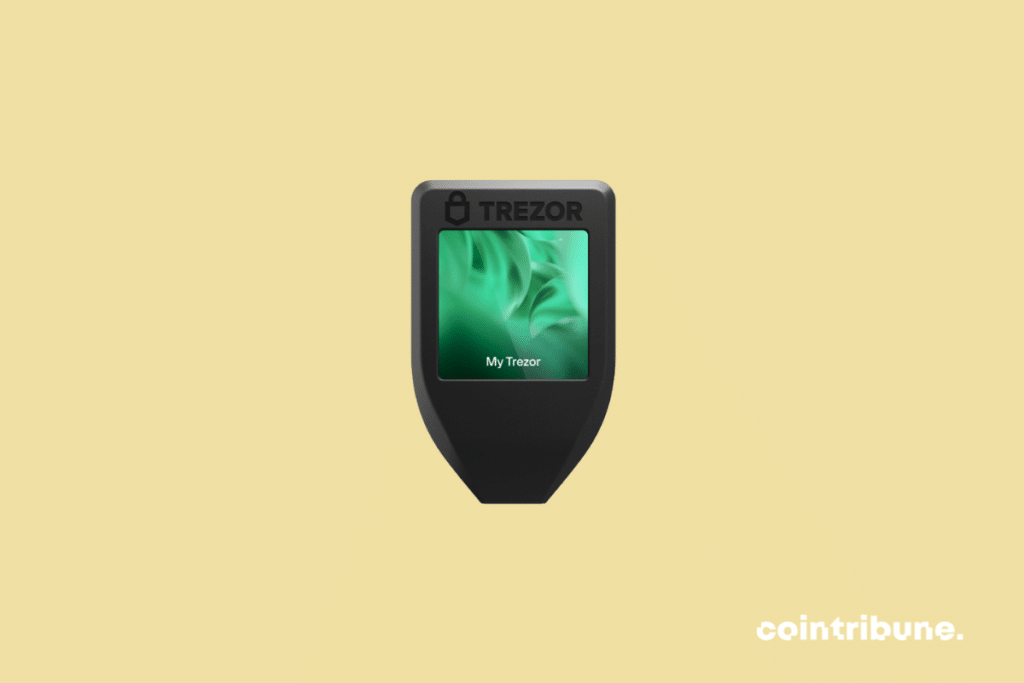Hard Wallet Bitcoin: What Is It?
In the world of cryptocurrencies, security is paramount. Users are constantly looking for solutions to protect their digital assets, as hacks are rampant. It is in this context that hard wallets, also known as hardware wallets have gained popularity. These Bitcoin wallets physically come in the form of a USB stick or a chip card. They are more sought after than online wallets, as they allow you to have complete control over your cryptocurrencies. In this article, we will explore in detail what Hard Wallets are, how they work, and how to choose the best one for your needs.

Overview of the hard wallet
A hard wallet, also known as a “hardware wallet” or “cold wallet,” is a secure hardware device that allows you to store and manage your crypto’s private keys offline. Indeed, the hardware wallet provides enhanced security in terms of storage. It is part of several types of so-called secure processing methods for storing digital assets.
The hard wallet acts like a safe that makes your cryptocurrencies perfectly inviolable. Reviews on Bitcoin hard wallets are very positive. No remote theft or hacking attempt has any impact on your cryptos. The device prevents any hacker from accessing your assets and personal data. You are the only one able to control transactions with your crypto account.
Furthermore, a hard wallet consists of two elements that are involved in its operation:
- A public key,
- A private key that is known only to the wallet owner, which legitimizes it and allows them to authorize transactions. This key allows proof to all peers on a network that one is indeed the legitimate owner of such or such crypto.
Hard wallets are generally equipped with a screen to display transaction information and a button to confirm transactions. They are considered as one of the safest methods for storing cryptocurrencies, offering an alternative to online crypto wallets that can be vulnerable to hacker attacks.
What are the different types of wallets?
With the development of digital technologies and the rapid digitization of cryptocurrency assets, the wallet has undergone significant evolution. Today, there are several types of crypto wallets, namely:
- The desktop wallet,
- The mobile wallet,
- The online wallet,
- The paper wallet,
- The hardware or physical wallet,
- The hot wallet,
- The cold wallet.
In reality, all these wallet designations are classified into two main categories for storing and managing cryptocurrencies: hot wallets and cold wallets, or online wallets and offline wallets. Each of these classes of crypto wallet has advantages and disadvantages, particularly in terms of security, cost, and convenience.
Hot wallets (soft wallets)
Hot wallets or “hot wallets” are online digital wallets. They involve hot storage solutions. They concern anything that is software wallets and operates with the Internet. They are recommended for storing your private keys on devices connected to the Internet, such as computers, smartphones, or online servers. And, don’t worry! With the same tools, it is possible to find and access your information.
Hot wallets are convenient, easy to access, and for the most part, quite resilient to hacking attacks. These wallets are frequently used for storing and managing cryptocurrencies. They offer quick and convenient access to cryptocurrencies as long as there is a reasonably stable internet connection. However, they pose higher security risks due to precisely this exposure to the Internet, representing a large attack surface for hackers. They do not hesitate to seize this window of opportunity to take control of the entire system. It is therefore very risky to use hot wallets for storing significant amounts of money. Nevertheless, some users find that they represent a good option, owing to their ease of daily use.
Hot wallets are divided into 4 types of wallets:
- Light wallets: which ensure the simplified verification of all transactions made by a user. They are available on computer, Android, or Tablet. These include: Electrum, Exodus, or BRD.
- Full nodes: which perform all possible tasks to guarantee the health of the cryptocurrency network. This type of wallet can be used by both ordinary people and professionals.
- Browser extensions: These wallets always verify transactions before validation. They are very useful for interacting with the network and third-party applications. The most well-known extension is Metamask.
- Web wallets: These are online interfaces that allow a user to manage funds. Blockchain.com is one of them. By using web wallets, you control your private keys and keep a watchful eye on all your data.
Hard wallets (Cold wallets)
Cold wallets are offline wallets, meaning not connected to the Internet. In the world of cryptocurrencies, they are referred to as “cold wallets.” They are cold storage solutions that keep your private keys on physical media, such as paper, a chip card, or a secure hardware device, like a hardware wallet.
Practically, a cold wallet offers enhanced security compared to a hot wallet. This type of crypto wallet is not exposed to cyberattacks because it is not subject to internet vulnerabilities. Indeed, the data preservation system set up by cold wallets reduces the attack surface for hackers and eliminates cases of data theft.
The cold wallet is an ideal alternative to keep your cryptographic assets secure and to maintain large amounts of cryptocurrencies in the long term. Moreover, almost all exchange platforms and brokers, who are prime targets, resort to this solution and keep a large portion of their digital money in cold wallets. Given that the cold wallet renders scams like phishing impossible, it is much more advisable for storing funds.
Note that any device that remains offline can act as a cold wallet. However, a hardware wallet will be much more useful. Why? The hardware wallet is the safest means for cold storage of a digital currency. It can be used directly by users and is, of course, paid. In most cases, it is a device similar to a USB stick that signs your transactions using the privately stored keys. The user is the sole owner of their cryptocurrency. However, cold wallets can be less practical to use on a daily basis.
How does a Hard Wallet Bitcoin work?
The hard wallet offers an unparalleled level of security to protect your valuable digital assets from cybercriminals. But how does it actually work?
The use and security of Hard Wallets Bitcoin
A Bitcoin hard wallet securely generates and stores the private and public keys associated with your Bitcoin addresses. Once you purchase the device, you need to connect it to your computer, tablet, or smartphone via a USB cable. These tools will be useful for making cryptocurrency transactions. They will be considered as a terminal where a software will be created. It is this software that will serve as an interface to ensure the use of the wallet and to guarantee transaction operations. It is also through this software that it will be possible to connect and control cryptocurrencies.
Then, you need to create a PIN code and a recovery phrase to secure access to your wallet. This step is essential if you want to interact with the network. Each time you wish to access your cryptos, a request for authorization will automatically present itself to you. After validating the request by entering the code and the recovery phrase, you can retrieve your data. In short, your virtual currency is secure with a hardware wallet. As for your assets, they will be untouchable.
After configuring your hard wallet, you can use it to receive and send bitcoins. When you want to make a transaction, the device asks you to confirm it by pressing a physical button or entering the PIN code. This two-factor authentication ensures that you are indeed the wallet owner and that you authorize the transaction.
Private keys and public keys
Private keys are secret codes used to sign transactions and prove that you are the owner of the bitcoins associated with a specific address. These keys are also useful for granting access to your Bitcoin funds. If you possess a private key, your information displayed on the blockchain will be secure.
Public keys, on the other hand, are used to generate Bitcoin addresses and allow other people to send you funds. The public key is unique and always pairs with the private key. This connection between the two types of keys allows other users to recognize your signature and your data.
Moreover, if there is one important thing to remember, it is this: private keys and public keys must be protected at all times. Otherwise, their disclosure could lead to the loss of your digital assets and consequently, all your personal information.
Offline storage
Hard wallets store your private keys offline, which protects them from cyberattacks and malware. When it is necessary to carry out a transaction, the hard wallet generates a digital signature without revealing the private key online, thereby ensuring the security of your digital assets. By using a cryptocurrency hardware wallet, you can not only protect your private keys but also sign transactions and interact with a blockchain without risking exposing your secret codes.
Why use a physical wallet?
Physical wallets offer a higher level of security than online wallets, as they store your private keys offline, safe from hackers and malware. You do not need to enter your banking information when using this type of wallet. They also provide a reliable way to keep your cryptos in case of a failure of an online service, a cyber attack, or a power outage.
Moreover, they are easy to use and provide flexibility, as they are compatible with a good number of electronic wallet software. Furthermore, they are resistant, durable and therefore practical for daily use. Hardware wallets are the best choice when you want to avoid any risk of hacking and theft of your digital currency.
Advantages and disadvantages of a Hard Wallet
Before opting to use a hardware crypto wallet, it is important to consider the advantages and disadvantages associated with this cryptocurrency storage device.
Advantages
If hardware wallets are so favored by users and very popular, it is precisely for the many advantages they offer.
Enhanced security
As we have already indicated, hardware wallets offer increased protection against cyber attacks and malware, as they store your private keys offline. They protect your security codes by completely isolating them from online connections.
Accessibility and control
Physical wallets allow direct access and control over your cryptocurrencies, without relying on an online service or a third party. You have the exclusive responsibility for the security of your digital assets and can manage them independently. In other words, you are the sole responsible and owner of your tokens. No one can access this information without your authorization.
Ease of use
The hardware wallet is quite simple to use. The device can be taken anywhere with you and, in some cases, it may support more than 1000 different crypto-assets. This is the case with the Trezor Model T. Whether in terms of its features or the technologies used for its design, even a beginner can use a hardware wallet and make profits.
An adapted storage solution
Crypto hardware wallets are convenient for storing a large amount of cryptos offline. This means you will never fall victim to the theft of your bitcoins. The storage space designed for each hardware wallet allows it to meet your needs.
Disadvantages
Although hardware wallets are generally considered a safe and efficient way to store cryptocurrencies, they also have some disadvantages. Here are a few.
Cost
Physical wallets may cost more than online digital wallets due to the cost of hardware and integrated security technology. That said, the prices of hardware wallets can vary considerably. It is therefore important to consider your budget when selecting one of these devices.
Loss or damage
Since hardware wallets are physical objects, they can be lost or damaged. If you misplace your hardware wallet or if it is damaged, you risk losing access to your funds. That is why it is important to keep your wallet in a safe place and avoid disclosing its access information to anyone.
Convenience
Hardware wallets may be less convenient to use daily than online wallets, as they are physical devices. Sometimes, certain devices may seem bulky. Furthermore, they may also be slower for processing a transaction and incompatible with mobile devices running iOS or Mac.
Limited usage
The hardware wallet has a major flaw: its battery life is limited. This limits its usability and constitutes a real problem.
Choosing the best Hard Wallet for your needs
The multitude of hardware wallets available on the market can cause a dilemma in choice. However, the selection of the best Hard Wallet depends on your needs and priorities in terms of security, cost, and convenience. Here are some criteria to consider when selecting a physical wallet.
Selection criteria
The selection criteria for a hardware wallet include:
Security
Security is undoubtedly the most important criterion when it comes to storing cryptocurrency assets. Ensure that the hardware wallet you choose uses strong security measures. It should especially have features for data encryption, protection against physical attacks, and recovery mechanisms in case of loss or theft of the device.
Compatibility
Some hardware wallets only support a limited selection of cryptocurrencies. Therefore, make sure to choose a Hard Wallet compatible with the cryptocurrencies you wish to store.
Ease of use
Choose a physical wallet that offers an intuitive user interface and practical features, such as the ability to manage multiple addresses or make transactions in a few clicks. Also, check if the wallet you choose has all the features you are looking for.
Price
You will find hardware wallets at different prices depending on the brand, model, and its features. Choose the model that suits your needs and whose price fits within your budget.
Comparison of the most popular hard wallets
There are clearly several brands of hard wallets available on the digital currency market and some are more well-known than others. Here are some of the best most popular hard wallets.

Ledger Nano X
The Ledger Nano X is a Bluetooth physical wallet with an OLED screen and support for more than 1,500 cryptocurrencies. It is renowned for its enhanced security, extensive compatibility, and ease of use. With its form resembling that of a USB key, the Ledger Nano X is easy to handle and goes wherever you do. Thanks to its Bluetooth function, it is compatible with all mobile devices. Ledger Nano X is considered one of the best hardware wallets on the market.
Trezor Model T
The Trezor Model T is a hardware wallet with a color touchscreen and supports more than 1,000 cryptocurrencies. It is the main competitor of Ledger Wallet and the most recommended wallet for cryptocurrency beginners. It offers robust security, an intuitive user interface, and advanced features, such as password management and two-factor authentication. Very lightweight, this device is particularly lightweight and features an easy-to-handle platform.
KeepKey
KeepKey is a physical wallet with an OLED screen and supports over 40 cryptocurrencies. It stands out for its elegant design, strong security, and integration with the ShapeShift software wallet for quick exchanges between cryptocurrencies. It features excellent craftsmanship and its price is relatively affordable. It is the perfect solution for storing cryptos.
BitBox 02
BitBox 02 is a minimalist hardware wallet that supports ethers, bitcoins, litecoins, and ERC-20 tokens. It has no buttons but an intuitive interface and works with Android, Linux, MacOS 10.11 or higher, and Windows 7 and above. This physical key has two-factor authentication mode for added security.

Conclusion
Ultimately, Bitcoin hardware wallets, just like Bitcoin soft wallets, provide a secure and reliable solution for storing and managing your cryptocurrencies. However, Bitcoin hardware wallets are an excellent investment for protecting your digital assets against cyber attacks and malware. Nevertheless, it is essential to choose the right physical wallet based on your needs and priorities, particularly regarding security, storage capacity, cost, and convenience. Remember to always follow best security practices to ensure maximum protection of your digital assets.
Maximize your Cointribune experience with our "Read to Earn" program! For every article you read, earn points and access exclusive rewards. Sign up now and start earning benefits.
The Cointribune editorial team unites its voices to address topics related to cryptocurrencies, investment, the metaverse, and NFTs, while striving to answer your questions as best as possible.
The views, thoughts, and opinions expressed in this article belong solely to the author, and should not be taken as investment advice. Do your own research before taking any investment decisions.